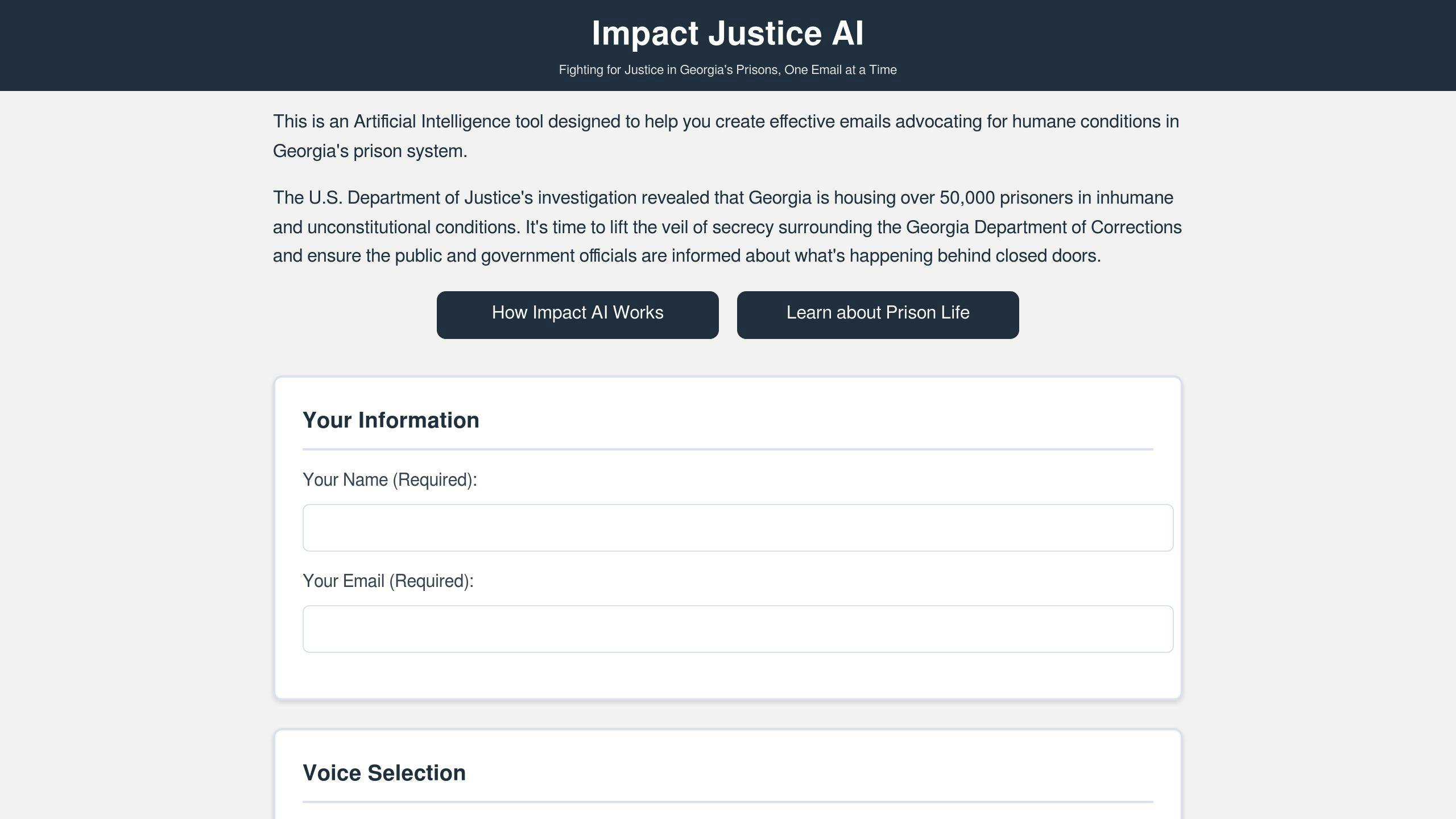To access Georgia prison financial records, follow these steps:
- Understand the Georgia Open Records Act (ORA): This law allows public access to most government records, including prison financial documents. Restricted records include security-sensitive data and personal details.
- Decide What to Request: Focus on specific records like institutional budgets, vendor contracts, or trust account data. Be clear about the facility name, time period, and document type.
- Submit Your Request: Use the Georgia Department of Corrections (GDC) online portal or send a written request by mail. Include your contact details, a clear description of the records, and your preferred delivery format (digital or physical).
- Know the Costs: Expect fees for copies ($0.10 per page) and staff time for searching and redacting. Digital delivery can reduce costs.
- Follow Up: The GDC must respond within three business days. If delayed, politely follow up or adjust your request. For denials, request a written explanation.
Quick Tip: Be specific and concise to avoid delays or high fees. Use tools like Impact Justice AI for professional follow-ups if needed.
Basics of Open Records Requests in Georgia
What Are Open Records Requests in Georgia?
The Georgia Open Records Act (ORA), detailed in O.C.G.A. §50-18-70, gives the public access to government records, promoting transparency in government operations. This law allows individuals to request most records, including those held by the Georgia Department of Corrections (GDC). Once a request is received, the GDC has three business days to either provide the records, explain a denial, or request more time to fulfill the request [2][3].
Which Records Are Accessible and Which Are Not?
The ORA is a helpful way to examine financial records and understand how public funds are used in Georgia’s prison system. Here’s a breakdown of what you can and cannot access:
| Accessible Records | Restricted Records |
|---|---|
| Institutional budgets and vendor contracts | Security-sensitive information |
| Trust account data | Employee personal details |
| General financial transactions | Medical records without HIPAA consent |
The GDC charges $0.10 per page for copies, with extra fees for the time spent searching and redacting information [3]. For Inmate Trust Accounts with balances over $10.00, a monthly processing fee of up to $1.00 may also apply [1].
Some records are confidential due to privacy or security concerns, including:
- Investigative records
- Security-related policies
- Offender medical and mental health records (without proper authorization) [3][4]
To make the process smoother, focus on requesting specific documents that aren’t restricted. Once you know which records are available, the next step is submitting a clear and well-structured request.
How to Request Georgia Prison Financial Records
Deciding Which Financial Records to Request
Before making your request, pinpoint the exact financial documents you need from the Georgia Department of Corrections (GDC). Accessing these records ensures transparency in how taxpayer money is spent and supports efforts to improve prison systems.
Here are some common types of records to consider:
| Record Type | Examples | Notes |
|---|---|---|
| Institutional Budgets | Facility operating costs, program funding | Specify the facility name and time period |
| Vendor Contracts | Food service agreements, maintenance contracts | Include vendor names if available |
| Trust Account Data | Policies on account management, associated fees | Proper documentation may be needed for individual accounts |
When crafting your request, be as specific as possible. For instance, ask for "Smith State Prison operating budget for 2024" rather than a general inquiry.
How to Submit Your Request
You can submit your request online through the GDC’s portal or by mail. Be sure to include:
- Your full contact details
- A clear description of the financial records you’re requesting
- Relevant dates and facility names
- Your preferred delivery format (digital or physical)
For quicker processing, use the GDC’s online portal.
Understanding Costs and Fees
The GDC applies the following charges for record requests:
| Service | Cost |
|---|---|
| Standard copies | $0.10 per page |
| Search and retrieval | Hourly rate of the lowest-paid qualified employee |
| Digital delivery | May reduce or eliminate copy fees |
To keep costs down:
- Focus your request on specific date ranges
- Opt for digital copies when possible
- Clearly identify the financial records you need
- Avoid overly broad requests that require extensive searches
You’ll receive a cost estimate before your request is processed, giving you the option to adjust or cancel it if necessary.
Once your request is submitted, it’s helpful to know what steps follow and how to address any potential delays.
What to Do After You Submit Your Request
What Happens After You Submit?
Once you submit your request, the GDC will confirm they’ve received it, let you know if the records are available, and provide a cost estimate. If they need more details or if access to some records is restricted, they’ll ask for clarification or suggest you adjust your request.
| Response Type | What It Means | Your Next Steps |
|---|---|---|
| Records Available | Documents can be accessed | Review the cost estimate and approve it |
| Partial Access | Some records are restricted | Adjust your request if necessary |
| Clarification Needed | Request is too broad or unclear | Provide the needed details |
How to Handle Delays or Problems
If there are delays or issues with your request, here’s how to stay on track:
- Keep a Record of Everything: Save all communications, including dates and contact names.
- Follow Up Politely: If you don’t hear back within three business days, send a professional follow-up email and reference your original request number.
- Deal with Denials: If your request is denied, ask for a written explanation that cites specific exemptions under the Open Records Act.
For more complicated requests, like those involving financial records, or if delays persist, try these options:
- Simplify Your Request: Break large requests into smaller, easier-to-process parts.
- Get Help: Reach out to the Georgia Attorney General’s Office for advice.
- Seek Legal Advice: Contact organizations that focus on government transparency for support.
"The Open Government Act shall be broadly construed to allow the inspection of governmental records" [2].
Tools like Impact Justice AI can assist in drafting follow-up emails that maintain a professional tone. While the GDC is required to process requests as quickly as possible, more detailed or complex requests, like those involving financial records, may take extra time. Knowing how to handle setbacks or denials can make all the difference in obtaining the records you need.
sbb-itb-25113a2
Tools and Resources for Advocacy
Using Impact Justice AI for Advocacy

While Impact Justice AI doesn’t handle financial record requests, it plays a key role in advocacy by helping users craft impactful communications about prison financial transparency. The platform is particularly useful for drafting professional emails to government officials or media outlets, whether you’re following up on records requests or addressing broader transparency concerns revealed through financial records.
Other Useful Contacts and Resources
The Georgia Department of Corrections (GDC) has specific guidelines for processing financial records requests. Additionally, several organizations and resources can provide assistance in accessing these records and pushing for transparency:
Legal Aid Organizations:
- Georgia Justice Project (gjp.org): Offers legal advice for navigating open records requests.
- Southern Center for Human Rights (schr.org): Specializes in advocacy for prison reform.
- ACLU of Georgia (acluga.org): Helps with legal challenges tied to records access.
Key Government Resources:
- GDC Open Records Request Portal: https://gdc.georgia.gov/contact-us/open-records-request
- Georgia Attorney General’s Office: Provides guidance on interpreting the Open Records Act.
"The strong public policy of this state is in favor of open government; that open government is essential to a free, open, and democratic society; and that public access to public records should be encouraged to foster confidence in government" [2].
These resources can support your efforts in obtaining financial records and advocating for greater transparency within Georgia’s prison system.
How to Make an Open Records Request
Conclusion: Steps to Access Georgia Prison Financial Records
Getting access to Georgia prison financial records involves following the right steps and paying attention to the details. The Georgia Department of Corrections (GDC) has clear guidelines in place to help you make a successful request.
When using the GDC’s Open Records Request portal, be clear about the specific records and timeframe you’re asking for. A well-detailed request reduces the chance of delays. Keep in mind that the GDC will provide a cost estimate, which may include fees for searching, redacting, and copying [3].
It’s important to keep a record of all your communications with the GDC. Note down when you submit your request and any follow-ups. If there are delays, follow up professionally, keeping in mind the three-business-day response rule.
Be aware that some records, like those containing security-sensitive or personal information, are not available for public access [3][4]. Plan your request with these restrictions in mind to avoid unnecessary complications.
If you need extra help, tools like Impact Justice AI can assist in drafting professional follow-ups or broader communications. By handling the process effectively, you play a part in promoting greater transparency and accountability in Georgia’s prison system.
FAQs
How do I request open records in Georgia?
To request open records from the Georgia Department of Corrections (GDC), you can use their online portal or send your request by mail. Make sure to include:
- The specific financial records you’re requesting
- The relevant time period for the records
- Your full contact details
For step-by-step instructions, check the "How to Submit Your Request" section earlier in this guide.
Does Georgia have FOIA?
Georgia has its own version of FOIA called the Georgia Open Records Act (GORA), outlined in OCGA §50-18-70 to §50-18-78 [4]. This law governs access to records from state agencies, including those managed by the Department of Corrections. To learn about exemptions and restrictions, see the "Which Records Are Accessible and Which Are Not?" section above.
"The Georgia Department of Corrections has specific procedures for handling offender financial transactions and business activities, including the management of inmate trust accounts" [1].
If you’re working on a complex request or need help with follow-up communication, tools like Impact Justice AI can assist in drafting professional messages while ensuring compliance with GORA guidelines. For more details, revisit the earlier step-by-step instructions in this guide.

1 thought on “How to Request Georgia Prison Financial Records”